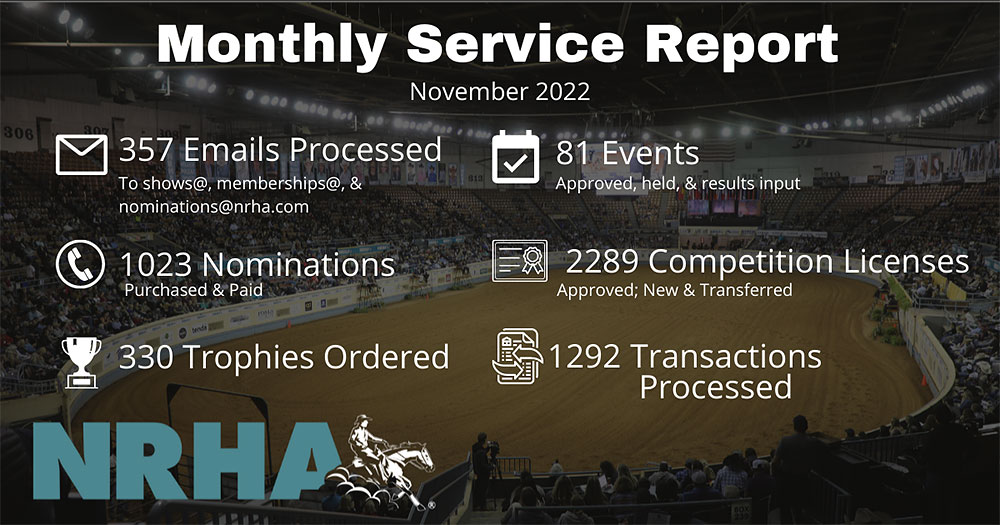
NRHA Monthly Service Report—November


The National Reining Horse Association (NRHA) is excited to announce the invitation to members interested in becoming NRHA judges to join the Judges Applicant Seminar. This unique, once-a-year opportunity will take place March 15–16, 2023, at the NRHA office in Oklahoma City, Oklahoma.

NRHA Judges serve an essential role in the reining industry by providing their time and expertise when judging NRHA events, which drives the future of how reining horses are trained and presented.
“Consistent and fair judging promotes a healthy association, and it’s exciting to have new talent coming into the reining industry,” noted Patti Carter, NRHA’s Sr. Director of Education and Officials.
Those seeking to be an NRHA judge will have the opportunity to receive proper guidance in this exclusive applicant seminar as the first step in becoming an NRHA Judge. Seminar attendees must pass testing requirements, and once accomplished, they will be eligible to attend an NRHA Judging School. At this event, they will complete testing and be able to apply for their official card.
Requirements include being at least 25 years of age and must have been an NRHA member in good standing for 24 months prior to the date of application.
Aspiring attendees must submit the mentioned application by December 31, 2022.
To check to see if you meet the applicant criteria and to apply, visit nrha.com/judges.
In early fall, the Stewards Committee of the National Reining Horse Association hosted the first two Online Steward Recertification programs. This change has meant that NRHA Stewards, who previously had to travel for recertification, can now conveniently do so online.
The idea to change the recertification process was initiated by the Stewards Committee Chair Ed “Hoot” Bricker.
“One of our main goals was to move some of our programs to an online format,” noted Patti Carter, NRHA Director of Education and Officials. “We are very proud of the online recertification program that was launched. As a team, we have effectively saved everyone time, money, and perhaps most importantly, everyone worldwide is receiving the same, updated information to service the NRHA membership and the entire reining industry.”
Carter gave special accolades to the three individuals who led the recertification course. “Ed (Hoot) Bricker, Van Luse, and Ann Salmon-Anderman did an outstanding job teaching the content while engaging the online participants,” she said. “Well done!”
NRHA Show Steward Walt Larson, who went through the program, agreed. “I thought it was excellent. It was a three-hour meeting, and the instructors really went through and highlighted things in the [rule] book that they’re looking for. I thought the time we spent in the meeting was very valuable. We were able to bounce ideas off each other and learn from everyone’s experiences,” he said.
Stewards who participated in the online recertification process were Ed Cridge, Alberto Ferara, Margaret Fuchs, Walter Larson, Marilyn Randall, Maura Moraglione, Mauro Fungo, Enrico Giaretta, Mark Guynn, Marlin Holroyd, Lyle Jackson, Careena Laney, Manuela Maiocchi, Shawn McClurg, Susan Moore, Christian Rammerstorfer, Christina Serra, Andrea Stillo, Alberto Villani, Larry Gleeson, Travis Chapman, Alessandro Fossa, Jamie Solberg, Eleonora Malerba, Giovanni Fano Pagani, Mauro Vittorelli, Sandy Jirkovsky, and Drake Johnson.
“I enjoyed the seminar and now have the tools to better perform in the field. The seminar was a truckload of information, guidance, and tools. I feel all of you have elevated the Stewards program to the next level of excellence,” noted NRHA Show Steward Larry Gleeson. “It certainly is my goal to meet these expectations as a representative of the Stewards program.”
Although recertification can be done online, anyone who is interested in becoming an NRHA Steward is still required to attend an in-person Steward Applicant school.
More information about the Stewards program can be found at NRHA.com/stewards or by contacting Carter at pcarter@nrha.com
The National Reining Horse Association (NRHA) Board of Directors recently approved a 5-year plan with gradual service fee increases every other year as proposed by the Finance Committee. The first increase will begin in 2023, with the next changes coming in 2025 and 2027. This change presents an opportunity to save on memberships and services through December 31.
The updated fees policy can be found on the Fees & Services page at nrha.com. Many of the changes will be in the $5-$10 range. For example:
General / Non Pro 1-Yr. Membership $125 (from $115)
Professionals 1-Year Upgrade $55 (from $50)
Non Pro Declaration $45 (from $40)
Competition License (New or Transfer) $65 (from $60)
“Our industry is thriving, and we have a lot of momentum right now,” said NRHA President Rick Clark. “These increases that the finance committee recommended are necessary to help keep that momentum going, especially with all the exciting additions that we have coming next year. This plan is part of our five-year budget and is a solution so that our membership can have a gradual increase instead of a large increase at once, which we have seen in the past.”
NRHA is a multi-facet organization providing layers of services for members like the Green Reiner buckle awards program, Top Ten Year-End Awards, technology enhancements to better serve members, the North American and European Affiliate Championship programs, judges training and credentialing, etc. The demand for these programs continues even as talks of unfriendly market forces and the cost of doing business increase. NRHA leadership is committed to taking steps to ensure these operations are funded and mitigate inflation and recession.
“We are on target to keep our association financially responsible even with inflation and increased purses, and I commend the finance committee on creating a solution that is forward-thinking and provides security for NRHA.”
For NRHA, it has been several years since membership and licensing fees have increased, and in the past, fee increases have not kept pace with the cost of providing programs and services. The continued absence of fee increases will create a deficit in programs that could result in limiting or sun setting those programs. The leadership made many hard decisions to manage the Association’s finances throughout COVID and continues to look forward with financial guardianship of NRHA and its continued legacy. The planned every-other-year increases will be paired with targeted market investments, continued efforts to reduce expenses and drive efficiencies, as well as revenue enhancements to achieve NRHA’s goals and priorities. For an update on new, upcoming additions for 2023, such as increased 4-year-old stakes, an Affiliate Regional Championship Masters class, and a 2022 Buckle Ceremony, visit news.nrha.com.
